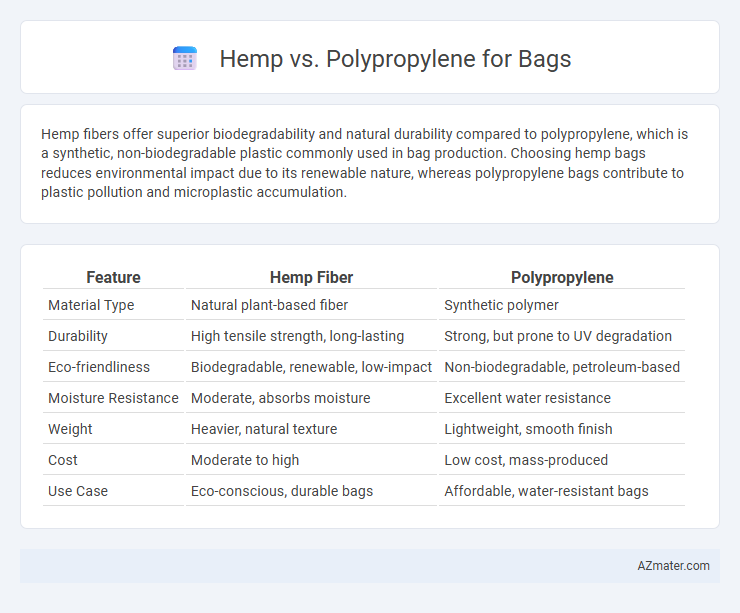Hemp fibers offer superior biodegradability and natural durability compared to polypropylene, which is a synthetic, non-biodegradable plastic commonly used in bag production. Choosing hemp bags reduces environmental impact due to its renewable nature, whereas polypropylene bags contribute to plastic pollution and microplastic accumulation.
Table of Comparison
| Feature | Hemp Fiber | Polypropylene |
|---|---|---|
| Material Type | Natural plant-based fiber | Synthetic polymer |
| Durability | High tensile strength, long-lasting | Strong, but prone to UV degradation |
| Eco-friendliness | Biodegradable, renewable, low-impact | Non-biodegradable, petroleum-based |
| Moisture Resistance | Moderate, absorbs moisture | Excellent water resistance |
| Weight | Heavier, natural texture | Lightweight, smooth finish |
| Cost | Moderate to high | Low cost, mass-produced |
| Use Case | Eco-conscious, durable bags | Affordable, water-resistant bags |
Introduction to Hemp and Polypropylene Bags
Hemp bags are made from natural fibers derived from the hemp plant, known for their durability, biodegradability, and eco-friendly properties, making them a sustainable choice for environmentally conscious consumers. Polypropylene bags, on the other hand, are manufactured from synthetic plastic polymers, offering strength, water resistance, and cost-effectiveness but contributing to plastic waste and limited biodegradability. The selection between hemp and polypropylene bags depends on factors like environmental impact, durability requirements, and intended usage.
Material Composition and Origins
Hemp bags are made from natural fibers derived from the Cannabis sativa plant, known for their strong, biodegradable, and renewable qualities. Polypropylene bags consist of synthetic polymers produced through the polymerization of propylene, a byproduct of petroleum refining, highlighting their non-biodegradable and fossil fuel-based origins. The material composition of hemp ensures sustainability and eco-friendliness, whereas polypropylene offers durability and resistance but contributes to plastic pollution due to its synthetic nature.
Environmental Impact: Sustainability Comparison
Hemp bags offer superior environmental benefits due to their biodegradability and rapid renewability, as hemp plants require minimal water and pesticides during cultivation. In contrast, polypropylene bags are derived from non-renewable fossil fuels and contribute to microplastic pollution, persisting in the environment for hundreds of years. Choosing hemp reduces carbon footprint and landfill waste, supporting a more sustainable and eco-friendly packaging solution.
Durability and Strength Analysis
Hemp fibers exhibit superior tensile strength and abrasion resistance compared to polypropylene, making hemp bags more durable for heavy-duty use and prolonged wear. Polypropylene bags, while resistant to moisture and chemicals, tend to degrade faster under UV exposure and frequent mechanical stress, limiting their longevity. The natural lignin content in hemp enhances its structural integrity, providing eco-friendly durability without compromising performance.
Weight and Comfort in Daily Use
Hemp bags are notably lighter than polypropylene bags, offering enhanced comfort for daily carrying due to their breathable and soft natural fibers. Polypropylene, while durable and water-resistant, tends to be heavier and less flexible, which can reduce comfort during extended use. Choosing hemp ensures a lightweight, comfortable bag ideal for everyday activities, whereas polypropylene prioritizes robustness over ease of wear.
Water Resistance and Weather Performance
Hemp bags offer natural breathability and moderate water resistance due to their dense fiber structure, making them suitable for dry conditions but less effective against heavy rain or prolonged exposure to moisture. Polypropylene bags provide superior water resistance and weather performance with their synthetic, non-absorbent material that resists mold, mildew, and UV damage, ensuring durability in wet and harsh outdoor environments. When comparing water resistance and weather durability, polypropylene stands out as the preferred choice for long-lasting protection and versatility in various climate conditions.
Biodegradability and End-of-Life Considerations
Hemp bags offer superior biodegradability compared to polypropylene, breaking down naturally within months under composting conditions without leaving harmful residues. Polypropylene, a synthetic polymer derived from fossil fuels, persists in the environment for hundreds of years, contributing to microplastic pollution and challenging waste management systems. End-of-life options for hemp bags include composting and recycling, whereas polypropylene often ends up in landfills or requires specialized recycling processes that are not widely available.
Cost Efficiency and Market Availability
Hemp bags offer eco-friendly benefits but often come with higher production costs due to cultivation and processing, making them less cost-efficient compared to polypropylene bags, which are mass-produced with lower material and manufacturing expenses. Polypropylene bags dominate market availability worldwide because of their lightweight durability, water resistance, and low price, catering to large-scale retail and promotional uses. Despite polypropylene's widespread use, rising consumer demand for sustainable products is gradually increasing hemp bag presence in niche markets focused on environmental impact.
Applications: Best Uses for Each Material
Hemp bags excel in eco-friendly markets, ideal for grocery shopping, fashion accessories, and promotional items due to their biodegradability and durability. Polypropylene bags are preferred for heavy-duty industrial and retail applications, including packaging, shipping sacks, and reusable shopping bags, owing to their strength, moisture resistance, and cost-effectiveness. Each material's best use depends on factors like environmental impact, longevity, and intended weight capacity.
Conclusion: Choosing the Right Material for Your Bags
Hemp offers superior sustainability with its biodegradable properties and strong durability, making it an eco-friendly choice for bags aimed at reducing environmental impact. Polypropylene provides excellent resistance to water, chemicals, and wear, delivering a cost-effective option well-suited for high-volume, durable bag production. Selecting the right material depends on prioritizing either environmental benefits or practical durability and cost-efficiency for your specific bag needs.

Infographic: Hemp vs Polypropylene for Bag
 azmater.com
azmater.com